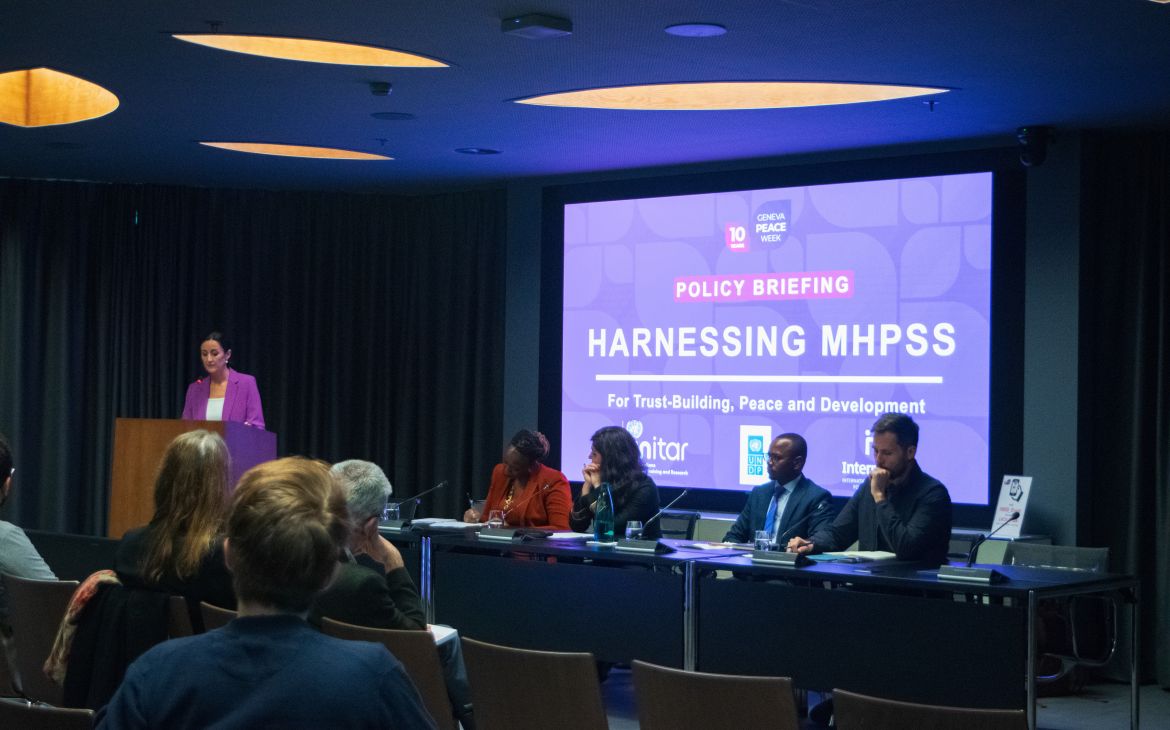Have any of your training participants been affected by or witnessed violence? You may not be sure…
How about stress? Certainly.
And traumatic stress? Again, you may not be sure…
How much do you consider these questions when designing and implementing learning events and training?
Following Security Council Resolution 2668 and General Assembly Resolution 77/300 (A/77/L.77) on MHPSS, organizations like UNITAR that work with people in conflict-affected and fragile contexts, are facing an increasing demand to become trauma-informed and to find meaningful ways to incorporate Mental Health and Psychosocial Support (MHPSS) principles into their interventions and operations, in order to avoid doing harm and to strengthen their quality.
UNITAR’s Division for Peace is actively working to develop integrated MHPSS approaches to enhance the effectiveness and positive impact of its global capacity-building initiatives for peacebuilding and sustainable development. See our recent panel at Geneva Peace Week.
Below we offer 10 entry points and tips on how to build your organization’s trauma awareness and MHPSS capacity:
Entry Point 1: Cultivate Basic Awareness
Introducing foundational training for staff on the basics of stress, trauma and wellbeing can help teams to understand the widespread nature of stress and traumatic stress among populations exposed to conflict and fragility, and to understand the impact that trauma can have on learning and capacity-building.
Entry Point 2: Incorporate Well-Being Practices into Team Routines
Adding wellbeing practices into daily routines can help teams to recognize and reduce stress responses in themselves and others, and to incorporate self-care and team-care strategies into training programs.
Entry Point 3: Ensure Trauma-Informed Project Design
Did you know that stress and trauma affect the learning process? While stress can increase learning motivation, it can significantly hinder how much information the brain can absorb and later retrieve. Avoiding trauma triggers and reducing stress among your learners is thus good for learning.
By embedding trauma-informed principles into project design, teams can ensure that training contents and methodologies avoid potential triggers and better foster safe spaces and supportive environments for participants and team members to participate and learn with ease.
Entry Point 4: Conduct a Trauma-Sensitive Analysis
For trainers, it may not be clear what behaviours and topics activate trauma and stress responses in your participants. A trauma-sensitive analysis can help.
Violence and its legacies take many forms–individual, collective, direct, and indirect. These include racism and discrimination, economic marginalisation, political persecution, intergroup armed conflict, as well as interpersonal physical, psychological, economic and sexual harm. Whole groups and nations can carry shared traumas. And even indirect exposure to the injustices and violence experienced by others can evoke strong emotions.
By including a trauma-sensitive analysis in the early stages of project design (together with context analysis, conflict analysis and gender analysis), teams can anticipate which topics and methods may evoke tensions in participants and plan for ways to ensure trauma-sensitivity and well-being in the training space.
Entry Point 5: Recognize Gender and Cultural Dimensions of Stress and Wellbeing
While stress, trauma and well-being are individual experiences, dynamics can appear based on gender, culture and contextual factors that shape how people are socialised. For example, women and men are often exposed to different forms of violence and socialised in different ways regarding the expression of emotions. Cultures, too, may shape how people express concerns and support wellbeing, etc. Awareness of such factors is key to ensuring that MHPSS strategies in a training setting are appropriately adapted. Read more on our approach to gender and inclusivity here.
Entry Point 6: Increase Local Community Engagement
Uncertain about how to approach these topics in an appropriate way? Turn to your local partners! Leveraging local community engagement and participation in project design enables communities to become active partners in ensuring contextually-adapted and sustainable MHPSS, by strengthening local resources to address the legacies of trauma and to foster community resilience.
Entry Point 7: Equip Trainers with the Basics of Trauma-Sensitivity
Conducting Training of Trainers on the basics of trauma sensitivity and MHPSS can equip trainers with the awareness and skills they need to handle sensitive topics and emotions that can arise in training settings. Knowing how to support participants in a trauma-informed manner benefits all of your training participants! For some practical tips on trauma-informed facilitation, check out this guide.
Entry Point 8: Be Adaptive and Flexible
What should you do when issues arise? First, don’t panic. Breathe, reflect, consult, and if needed, adapt. Demonstrating flexibility and adaptability in project plans is sometimes necessary in the face of partners’ and/or participants’ needs. Rather than pushing through, try to accommodate needs to avoid potential triggers and promote a trauma-sensitive approach to project implementation.
Entry Point 9: Encourage Continuous Feedback
Listening is one of the best strategies for building trust and strengthening collaboration. Whether with participants or your own team members, creating regular feedback channels is important for enabling people to express their concerns and needs and to receive timely support. Feedback can be given in different formats depending on sensitivity levels. Group sharing requires high levels of trust. More confidential forms of feedback can include anonymous written comments or individual check-ins. In all cases, encourage feedback and listen with open, non-judgmental consideration and care.
Entry Point 10: Align with Global Best Practices
There is a growing wealth of global expertise in trauma-informed intervention and MHPSS practices. Partnering with MHPSS experts can help teams enhance their integration of MHPSS principles and align initiatives with global best practices.
For further information and to discuss opportunities to collaborate, contact sara.habibi@unitar.org
Want to know more? Check out these two resources:


